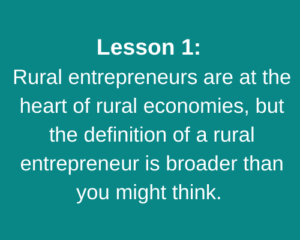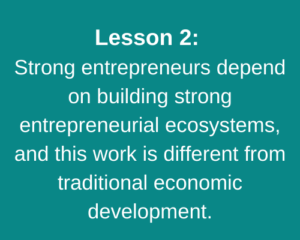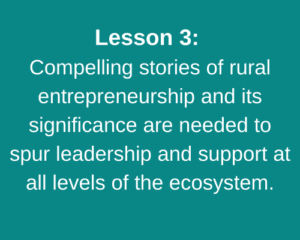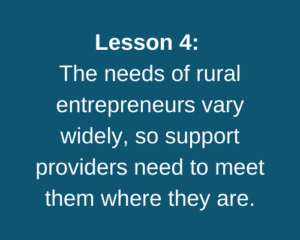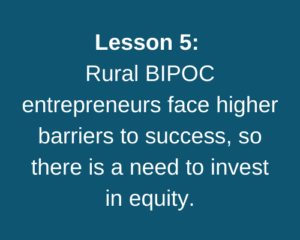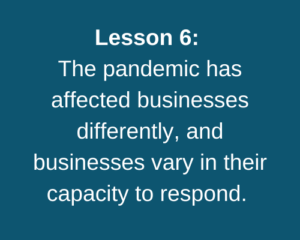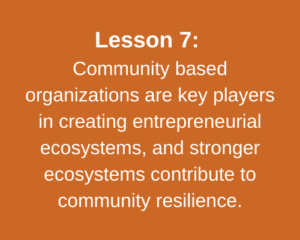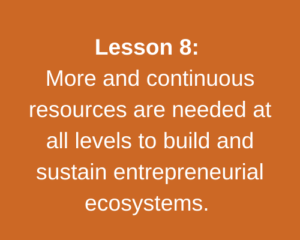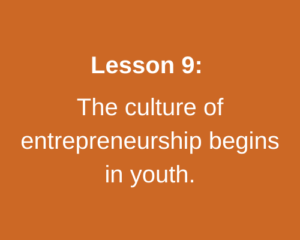Rural Entrepreneurship: Lessons Learned from Ecosystem Building in Oregon
Written by Amy Hause, Nate Davis, and Freya Hendrickson, March 2021
Executive Summary
This page shares lessons learned from the Rural Opportunity Initiative (ROI) program, a two-year program funded by the Ewing Marion Kauffman Foundation intended to support rural entrepreneurial ecosystem building in six communities in Oregon. This program, which comes to a close in July 2021, is led by Rural Development Initiatives (RDI) in partnership with Foundry Collective and Kelley Nonprofit Consulting. The program was initially conceived to fill a gap for a similar program with the same name offered by Business Oregon, when funding for that program was temporarily cut. Both programs provide funding for communities to design and build locally driven entrepreneur ecosystems.
We are pleased to present these interconnected lessons learned, with the hope that they can contribute to more robust and vibrant rural entrepreneurship, and ultimately contribute to greater rural vitality more generally. Some of these lessons we knew or at least strongly suspected before conducting this program, but they were reinforced, or more sharply delineated through the program and because of the pandemic. And some of the lessons were new territory for us.
Introduction / Background
RDI, its partners, and Business Oregon have prioritized the ROI program because we all recognize the importance that entrepreneurship plays in the vitality of rural communities. Rural communities suffered worse outcomes and recovered more slowly from the last recession than their urban and suburban counterparts (USDA), and may very well have the same experience post-pandemic. However, entrepreneurship is a critical aspect of the path forward for these communities. We understand that even in times of economic downturn, new businesses are the net job creators in communities (Ewing Marion Kauffman Foundation). This entrepreneurship activity allows for greater community control over the local economy, reduces the “brain drain” of young talent, and helps diversify rural economies to make them more resilient (Federal Reserve Bank of Minneapolis).
The design of the program recognizes that there are multiple levels of the ecosystem that need to function in order for rural entrepreneurs to thrive. There are the entrepreneurs themselves who need direct support, such as training, one-on-one advising, and access to information, markets, and capital. Then there are the community backbone organizations that provide various types of support directly to entrepreneurs, including city agencies, local non-profits, business incubators and innovation hubs, economic development agencies, Small Business Development Centers (SBDCs), and chambers of commerce. And then there are regional, state, and federal level organizations and agencies that provide technical assistance, training, and funding to the local organizations (and sometimes directly to entrepreneurs as well), as well as financial institutions and networks. These layers need to fit together and work in harmony without gaps in order for entrepreneurs – and the local economies they support – to thrive.
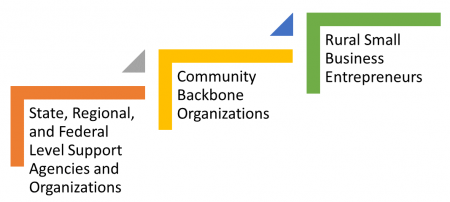
“The state has never been more responsive than in these times of COVID – let’s not lose that!”
– Participant at RDI’s Regards to Rural Entrepreneurship Session
The learnings outlined here were identified over the course of this program by RDI, its implementation partners, participating communities, as well as participants at the entrepreneur-focused pre-session at RDI’s Regards to Rural Conference in October of 2020.1 This interactive session brought together a wide range of stakeholders to brainstorm how to more effectively support rural entrepreneurs and build vibrant ecosystems.
While this program started before the pandemic, much of it took place during the pandemic, which heavily influenced the activities, outcomes, and learnings. In some ways, the pandemic slowed this work, and highlighted the needs of entrepreneurs. It particularly highlighted social inequities that underscore the different needs and barriers faced by BIPOC (black, indigenous, people of color) and other underserved entrepreneurs within rural communities. And in other ways, the pandemic revealed the need for entrepreneurs and entrepreneurial thinking, and demonstrated examples of resilience that we otherwise may not have recognized.
Now to the lessons – click on any lesson to dig deeper.
We hope that these lessons stimulate conversation, coordination and collaboration, contribute to the design of future efforts, and encourage further investment in this fundamental building block of rural community economies.
“Do those events, keep creating positive culture, providing hope for people, be a loud rural voice, stick up for your people. Advocate for investing in something other than catching the big fish.”
– Kat Rutledge, Director of Klamath IDEA
The Way Forward
Listen & Learn from Entrepreneurs:
Listen to rural small business entrepreneurs and their needs, their aspirations and ideas, and aim to meet them where they are. Pay particular attention to systemic barriers faced by BIPOC and other marginalized entrepreneurs. Small business entrepreneurs are an incredible asset in the development of rural economies.
Support Community-Based Hub Organizations:
Address Systemic Barriers and Build More Equitable Rural Economies:
Focus on Youth and Entrepreneurship in Education:
Communicate, Coordinate, and Partner:
Tell Stories & Advocate:
“Patient” Investment:
1 A rural entrepreneur video featured at RDI’s 2020 Regards to Rural Conference Pre-Session is below.
This program and the lessons learned document were funded by the Ewing Marion Kauffman Foundation. The contents of this publication are solely the responsibility of Rural Development Initiatives.


